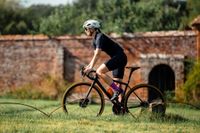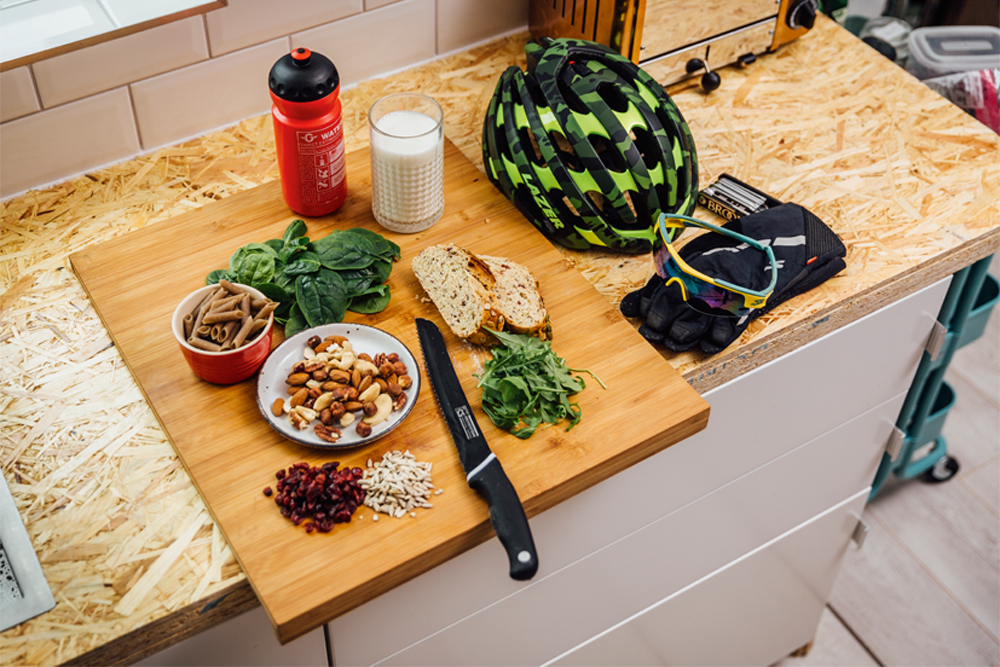A cyclist's guide to following a vegetarian diet
Anita Bean shows how to get your protein, iron and Omega-3s without eating meat


If you have chosen to follow a vegetarian diet, you may be wondering if you’re getting enough protein and other nutrients from plant foods to fuel your cycling and promote recovery.
The main protein sources for vegetarian cyclists are dairy foods, eggs, nuts, seeds, beans, lentils, soya products (tofu, tempeh), wholegrains (such as bread, oats, pasta, rice and millet) and quinoa.
However, most plant sources of protein — with the exceptions of quinoa, soya and hemp — do not provide all eight amino acids.
>>> Christmas alcohol swaps: cut the calories, not the fun (video)
The solution is to combine protein sources: grains with pulses (e.g. black beans and vegetable curry with rice); grains with dairy (e.g. porridge); soya with vegetables (e.g. tofu and vegetable stir-fry); grains or pulses with nuts (e.g. chickpea and nut burgers); dairy or eggs with vegetables (e.g. spinach and goat’s cheese frittata).
For optimal muscle recovery, aim for 0.3g/kg body weight (roughly 20–25g) post-exercise and per meal. This is equivalent to 500ml milk or 25g whey, soya, pea or hemp protein (mixed with water), or four tablespoons (200g) cooked pulses combined with five tablespoons (250g) cooked wholegrains (pasta, rice or quinoa).
>>> How to make your own recovery and energy drinks
The latest race content, interviews, features, reviews and expert buying guides, direct to your inbox!
The type of iron found in plants is less easy for your body to absorb than is the iron found in meat. However, you can increase the amount absorbed by eating a vitamin C-rich food (i.e. fruit, vegetables) at the same time as iron-rich foods.
Good plant sources of iron include wholegrains, quinoa, nuts, seeds, beans, lentils, leafy green vegetables, dried fruit and egg yolk.
Vitamin B12 deficiency is a risk for vegans, for whom supplementation is recommended. Adequate amounts can be obtained from eggs and dairy.
>>> Don’t let the Christmas party season slow you down
The richest source of omega-3 (fatty acids EPA and DHA) for non-vegetarians is oily fish. Flax seed, hemp oil, pumpkin seeds, chia seeds and walnuts do provide some alpha linoleic acid (ALA), which is converted to EPA and DHA in the body, but only at a limited rate. Consume a tablespoon of these per day.
‘I’m fitter and faster since going veggie’
Edward Greene, 25, is a semi-pro cyclist and rides for LowestRates Cycling Team based in Quebec, Canada
I decided to give up eating meat in 2010 after taking an Ethics course at university. It was a challenge at first; I had to embrace a whole new way of eating and cooking. But it has made me more adventurous in the kitchen and has led me to a much more whole foods-based diet and away from processed foods.
From a health perspective, I get sick less often — less of the annoying head colds, blocked noses and sore throats that often plague cyclists in hard training blocks.
>>> Winter’s here: Flu fighting foods
Since making the switch, my physical performance level has increased steadily each year for the last six years.
My rate of recovery has also improved, and my body feels cleaner, faster and leaner. With faster recovery comes increases in performance, as I can fit in more training sessions per year and lose less days to illness.
Avoid piling on the pounds over Christmas
Pros and cons of a vegetarian diet
Pros
A longer lifespan: long-term vegetarians live on average nearly four years longer than meat-eaters, according to 2016 research conducted at the Mayo Clinic, Arizona.
Lower heart disease risk: the EPIC-Oxford Vegetarian Study of 45,000 people showed vegetarians have a 32 per cent lower chance of developing heart disease.
Lower cancer risk: populations that eat less meat tend to have less cancer, particularly bowel, breast and prostate cancers.
Better for the environment: livestock farming is responsible for 15 per cent of greenhouse gas emissions.
More sustainable and a better use of land: 30 per cent of the planet’s available surface is used by livestock or for growing food for livestock.
Budget-friendly: Meat is much more expensive than plant-based proteins like beans, lentils, nuts, seeds and tofu.
Cons
Lack of nutrients: if you do not have a plan in place for getting the nutrients found in meat through vegetarian sources, you can fall short on protein, iron, zinc, omega-3s; and, for vegans, calcium and vitamin B12.
Not getting enough calories: plant-based diets are not very calorie-dense so you may unintentionally eat too few calories to fuel your cycling.
Eating too much fibre: many plant-based foods are high in fibre. Eating lots of high-fibre foods may cause premature satiety, gas, bloating and GI discomfort.
Anita Bean is author of The Vegetarian Athlete’s Cookbook, published by Bloomsbury, available from December 29
Michelle Arthurs-Brennan the Editor of Cycling Weekly website. An NCTJ qualified traditional journalist by trade, Michelle began her career working for local newspapers. She's worked within the cycling industry since 2012, and joined the Cycling Weekly team in 2017, having previously been Editor at Total Women's Cycling. Prior to welcoming her first daughter in 2022, Michelle raced on the road, track, and in time trials, and still rides as much as she can - albeit a fair proportion indoors, for now.
Michelle is on maternity leave from April 2025 until spring 2026.
